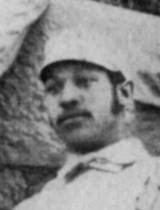Setting the Stage for Fleet Walker
On December 17, 1881, in an issue of The Chronicle—a vibrant newspaper that was published bi-weekly during the college year by students at the University of Michigan—H.A. Hodge (B.L. ‘82) wrote about the growing interest in athletics on campus. In this vein, Hodge discussed a meeting planned for December 23 in Chicago to establish a Western College League for baseball and rugby.[1] Delegates from Northwestern, Racine, Wisconsin, and Michigan would all be present at the meeting, and according to Hodge, “nothing [could] possibly be done to enhance the interest in Athletics more than the formation of this league.”
As Richard Millard Dott, a student and baseball player at Michigan during the 1880s, explained in a type-written report, by the spring of 1882, the so-called Western College Base Ball Association had been formed. Comprised of Northwestern, Racine, Wisconsin, and Michigan, the league arranged a schedule for the teams and organized a home-and-away series between each university.[2] The 1882 U-M squad of which Dott was a member was most notable for the presence of Moses Fleetwood Walker at catcher. Walker had just transferred from Oberlin College, becoming the first African-American to play sports at Michigan.[3]
Oberlin had long had a reputation as a forward-thinking institution, as in 1834 the school’s board of trustees opened the university to black students and women. Also known as “Fleet,” Walker enrolled in Oberlin’s preparatory program in 1877 at the age of twenty. In 1881, Oberlin reversed its ban on athletic contests against teams from off campus. This ruling allowed Fleet, a highly accomplished baseball player, to display his talents against outside competition during the spring of that year, and eventually resulted in Walker leaving Oberlin altogether
The 1881 Oberlin baseball club, the school’s first varsity intercollegiate team, played only five games. These competitions, however, were apparently enough to convince Fleet, and his younger brother Weldy, to become “pioneers in the practice of transferring colleges in search of a better fit for their athletic ambitions and talents.”[4] In fact, after Oberlin beat the University of Michigan 9-2 in a season-ending victory in 1881, the losing side was inspired to persuade Walker to play the following season in Ann Arbor.[5]
[1] The Chronicle (Ann Arbor, MI), December 17, 1881. Volume XIII, September 1881-June 1882. p. 87. University of Michigan Bentley Historical Library, Ann Arbor, MI.
[2] Richard Millard Dott. Type-written report by Richard Millard Dott, May 20, 1882. Richard Millard Dott papers, 1880-1883. University of Michigan Bentley Historical Library, Ann Arbor, MI.
[3] Adler, Rich. Baseball at the University of Michigan. Charleston, SC: Arcadia Publishing, 2004. p. 14.
[4] Zang, David. Fleet Walker’s Divided Heart: The Life of Baseball’s First Black Major Leaguer. Lincoln, NE: University of Nebraska Press, 1995. p. 22.
[5] Ibid.

